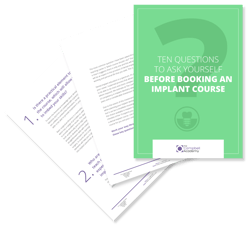
TEN QUESTIONS TO ASK YOURSELF
BEFORE BOOKING A DENTAL IMPLANT COURSE
Basic surgical proficiency is a teachable, acquired skill-set which has a range of principles to adhere to, to allow you to provide excellent results. This is learned in a variety of ways including practical-based courses, academic-based courses, practising acquired skills and mentoring.

Picking the right course is crucial, but it can be a minefield choosing one that is best suited to you. With all the choice available in implant training today, we have compiled this handy checklist of the 10 aspects you need to take into consideration before booking a dental implant course.
The most common question I have been asked throughout my whole implant teaching career is...
“which course should I do?”
The problem with this question is that it suggests there is only one and this will lead you to a place where you will be an expert in the provision of dental implants and therefore have the working and personal life that you seek. This is absolutely not the case.
Dental implant education is a spectrum. It’s a timeline that runs for the rest of your career.
A planned process that allows you to build on a strong foundation to be able to do more and more complex procedures to help your patients where required. We estimate at The Campbell Academy that to reach a stage of competency in implant dentistry takes approximately and on average five years and a considerable investment financially, emotionally and in time.
Due to the extent of this investment, it is important to consider many options when planning your implant dentistry career. Picking the right course is crucial, but it can be a minefield choosing one that is best suited to you. With all the choice available in implant training today, we have compiled this handy checklist of the 10 aspects you need to take into consideration before booking a dental implant course. Use the checklist to make sure you choose the right course for you and your career.
Work your way through the checklist by asking yourself these key questions:
Is there a practical element to the course, which will allow you to embed your skills?
To learn the theoretical knowledge about dental implants is fabulous, but if it’s not combined with a practical element you are unlikely to embed the information, the knowledge and the skills to be able to provide treatment in your own practice.
Basic surgical proficiency is a teachable, acquired skill-set which has a range of principles to adhere to, to allow you to provide excellent results. This absolutely can be taught, both academically and on pig’s heads or cadavers to allow people to develop and hone their skills prior to undertaking straightforward skills with individual patients. This is the fundamental basis for learning implant dentistry and implant surgery. A course which is heaped full of hand-on and practical elements will help you to get better at basic surgical skills and into implant placement as soon as possible. Have a read of our blog about the surgical skills required to be good at implant dentistry here.
Who are the faculty that teach on the course and what experience do they have in implant dentistry?
The course should include a range of speakers with a breadth of experience to allow individual delegates to gain as much information as possible. A good practise is to do some research and check the speaker’s biography and careers.
Is it a multi system course or a single system course? Which are you looking for and which do you think would be best to suit your needs?
While it is a good idea to focus on one single implant system when you’re learning straightforward implant dentistry so as not to become confused, one must also be wary of commercial pressures and the unconscious pressure that a company will have to push you as hard as possible into implant dentistry to get a return on the sponsorship of a course.
A 3 – 5 day intensive training course is never likely to provide you with all the skills and insights required to provide good implant dentistry at a straightforward level because the course is over too quickly and there isn’t enough time for reflection or review. The danger following these courses is that you are ‘released to the wild’ with minimal support and the prospect of placing implants on your own in your practice is terrifying.
Ask yourself if you want to focus and master one implant system or would like to explore more than one system.
Does it teach straightforward implant dentistry or more of a complex level and are you capable of this at this stage?
Implant dentistry is commonly separated into straightforward, advanced and complex procedures and each individual course should address one of those areas of teaching and not try to appeal to all. It’s inappropriate to teach complex procedures to people who have not yet mastered straightforward implant procedures. Our Year Implant course is designed for those looking to start out in implant dentistry and begin providing straightforward cases.
I would suggest that a procedure similar to much of implant dentistry is an apicectomy. If you feel confident providing this procedure in your practice at this stage, then you probably have the necessary surgical skills required, provided you can undertake it competently. If an apicectomy procedure is something that terrifies you, you are likely to be terrified by implant dentistry and you may have to start at a lower level, learning basic surgical skills first, in order to be able to move to implant dentistry.
Does it involve treatment on actual patients, which is mentored and safely guided?
It is essential during dental implant training to gain practical implant experience, both on models but, more importantly, on patients and it will encourage delegates to source, assess and plan their own patients in their own practice.
Is it research based or practical based?
In an ideal world, implant education would be full-time for three years in a hospital environment providing surgical and restorative procedures and keeping a log book. But for General Dental Practitioners wishing to enhance their skills, this is not feasible and a more user-friendly modular approach to practical and academic learning is more realistic.
It’s important that any practical skills are taught from a thoroughly researched basis. Research plays a vital role for both the trainer and the student. Practical based teaching and learning allows you to build your surgical skills and confidence from day one.
Does it explore the evidence of implant dentistry and teach procedures which are for competent individuals and not exceptional individuals?
Evidence based teaching and being up-to-date with current thinking should ultimately be at the very core of any implant training course. Hands-on practical training in small groups allows more scope to teach procedures to each individual that will grow their levels of competency more quickly and more confidently.
To become an implant surgeon and implant practitioner is a journey –
Some people are further down the journey than others when they begin, both in terms of skills and communication. We believe this is a long-term process to reach a level of placing approximately fifty implants per year or more to be competent. We absolutely believe that to place less than this in a practice over time is not sufficient enough to develop the individual, the team or the surroundings and people should consider that when moving along with their personal development.
Does it look like fun?
We all learn and thrive in different ways and environments. Some people will take more enjoyment from a classroom and home-study environment and some will gain more pleasure from the relationship building aspect of small group hands-on teaching. If one fills your heart with dread, then choose the one that makes you happiest.
Is there interactions between any modules or are you left in the dark? Do you have the ability to enter into online discussion with other members of the group?
A good dental implant course allows open and honest discourse both at the course itself and between modules. An Online Community will encourage collaboration and discussion in between course modules to learn as much as possible. A good course will also use a format which provides one or two days per month of teaching, together with inter-module discussion and education and practical arrangements is the ideal option for starting out in straightforward implant dentistry for young practitioners.
Is it centred around mentoring and practical knowledge or is it centre around academic knowledge?
A mentoring arrangement gives the opportunity for delegates to enhance their skills further on completion of the course and it will identify where delegate’s shortfalls and shortcomings are and assist them to allow them to improve. To reach a competent level to be able to move to advanced and complex implant dentistry is likely to take years not months and the career pathway in dentistry is to become secure and competent in straightforward implant dentistry before heading towards advanced and then complex implant dentistry.
Whichever path you take it’s essential to have a trusted mentor and advice giver throughout the whole process to assist you when times are di cult and to assist you in patient decision- making.
Book a FREE Consultation
Let's start with a 30 minute phone conversation with one of our Campbell Academy Directors to discuss your advanced training goals and how our courses can help you get there.
Following the call, you will receive a personalised action plan that maps out your Implant Education Journey with The Campbell Academy.
Request your free consultation by filling out the form: